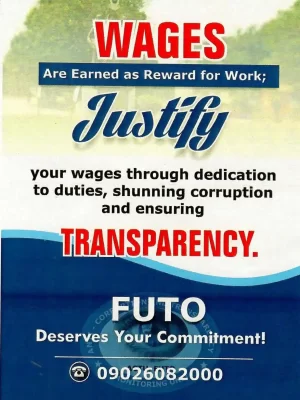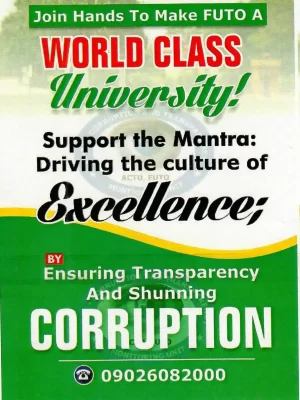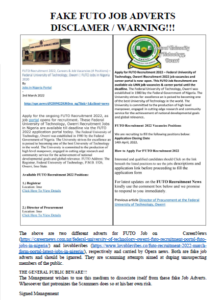Anti-Corruption and Transparency Monitoring Unit
Welcome
The Future of our University is in our hands. The Success Story Starts Today, And the Success Starts with You! …Shun all forms of Corruption to build the FUTO of our Dream!



History
The Anti-Corruption and Transparency Monitoring Unit (ACTU), FUTO was inaugurated in March, 2007 by the 5th substantive Vice-Chancellor, Prof C.O. E Ownwuliri. This was sequel to the approval for the establishment of ACTU in Ministries, Departments and Agencies vide Federal Government’s circular, Ref. No OHCSF/MSO/192/94 dated 2nd October, 2001 and another Government circular Ref. No OE/MS/MSO/169/S.1/7 dated April 16, 2003 respectively. However, in line with section 2 of the same standing order, ICPC officially ratified and confirmed the appointment of the members with effect from May 5th, 2009 when the oath of office was administered to the members by ICPC
Engr Prof C. I. Ijioma was appointed the pioneer Chairman of ACTU in FUTO by Prof. C. C. Ownwuliri. Under his auspices, the unit was firmly rooted and structured to corroborate the efforts of the Federal Government of Nigeria in stamping out corruption in institutions of government.
By the year 2012, Prof N. J. Okeudo was appointed to succeed Engr. Prof. C. I. Ijioma by the 6th substantive Vice -Chancellor, Prof C.C. Asiabaka following his retirement. The period witnessed quantum leap in sensitization as replete avenues and windows were made available to staff and students for complaints and information. This was crowned with a resounding public lecture by Archbishop A. J. V. Obinna to put the fight against corruptions on course.
Responsibilities
In order to avoid or minimize conflicts arising from overlap of functions with the existing appropriate authorities responsible for enforcing discipline in each establishment, the following categories of Misconduct should be appropriately handled by the Anti-Corruption and Transparency Unit:
- Suppression of Records: If the suppression is to cover up fraud or to cover up “corruption”, vide Section 15 of the Corrupt Practices and Other Related Offences Act, 2000, hereinafter referred to the Anti-Corruption Law.
- False Claim: The false claim provided in Public Service Rule 04401 becomes a crime under the Anti-Corruption Law if it was made by an officer in the course of his duty and against the Government or any of its Agencies.
- Corruption: Public Service Rules 04401 defines “corruption” as a serious misconduct and by virtue of Section 2 of the Anti-Corruption Law that acts includes “bribery, fraud and other related offences”. This, therefore, amounts to misconduct under the Public Services Rules and is a crime under the Anti-Corruption Law.
- Embezzlement: By virtue of Section 12 of the Anti-Corruption Law, embezzlement, recognized as a serious misconduct in PSR 04401, is equally a crime.
- Dishonesty: Dishonesty is a serious misconduct in the Service under PSR 04401. The import of the provisions of Sections 19 and 25 of the Anti-Corruption Law is that dishonesty in the discharge of official duty, which may cause the Government financial or proprietary loss, is also a crime.
- Falsification of Records: Falsification of records of any nature is a serious misconduct under Chapter 4 of the Public Service Rules. However, the falsification of record becomes a crime by virtue of Section 16 and 25 of the Anti-Corruption Law, if the “falsification of records” is with respect to government finances or government proprietary interests.
Contact Us
A small river named Duden flows by their place and supplies it with the necessary regelialia. It is a paradise
REACH US
Get Direction the Event Hall
Director, Physical Planning and Development Unit
Federal University of Technology, Owerri
PMB 1526
Imo State, Nigeria

